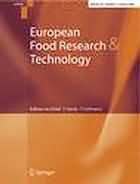|
Literature / Source Database:
European Food Research and Technology
Description
official organ of the FECS, Division of Food Chemistry
| Title (short) |
Eur. Food Res. Technol. |
| Languages |
English |
| First year |
1999 |
| Impact factor |
1.433 |
| Editor |
Th. Henle |
|
|

|
Status
active
Indexing
Abstracts on Hygiene and Communicable Diseases, AGRICOLA, Aluminum Industry Abstracts, Aquatic Sciences & Fisheries Abstracts, ASFA Aquaculture Abstracts, Biological Abstracts, Chemical Abstracts Service, Computer and Information Systems Abstracts, Corrosion Abstracts, CSA Civil Engineering Abstracts, CSA Mechan. Transport. Engineer. Abstracts, Current Contents, Field Crop Abstracts, Food Science and Technology Abstracts, Grassland and Forage Abstracts, Horticultural Abstracts, Index Medicus/MEDLINE, Index to Scientific Reviews, Personal Alert, Plant Breeding Abstracts, Referativnyi Zhurnal, Solid State and Superconductivity Abstracts
Predecessor
Zeitschrift für Lebensmittel-Untersuchung und -Forschung / A
Subject

Source type
Journal
Publisher
ISBN ISSN
1438-2377
E ISSN
1438-2385
First volume
204
Last volume
227+
Publish city
Berlin
Homepage
| Resources |
|
Availability |
|
|
|
|
|
| Text PDF |
 |
free access |
 |
| Text Html |
 |
for subscriber |
 |
| References |
 |
not available |
 |
| Abstracts |
 |
|
|
| TOC |
 |
|
|
|
|
|
|

Description
The journal European Food Research and Technology publishes state-of-the-art research papers and review articles on fundamental and applied food research. The journal's mission is the fast publication of high quality papers on front-line research, newest techniques and on developing trends in the following sections:
- chemistry and biochemistry
- technology and molecular biotechnology
- nutritional chemistry and toxicology
- analytical and sensory methodologies
- food physics
Out of the scope of the journal are:
- contributions which are not of international interest or do not have a substantial impact on food sciences,
- submissions which comprise merely data collections, based on the use of routine analytical or bacteriological methods,
- contributions reporting biological or functional effects without profound chemical and/or physical structure characterization of the compound(s) under research.
Related links:
|